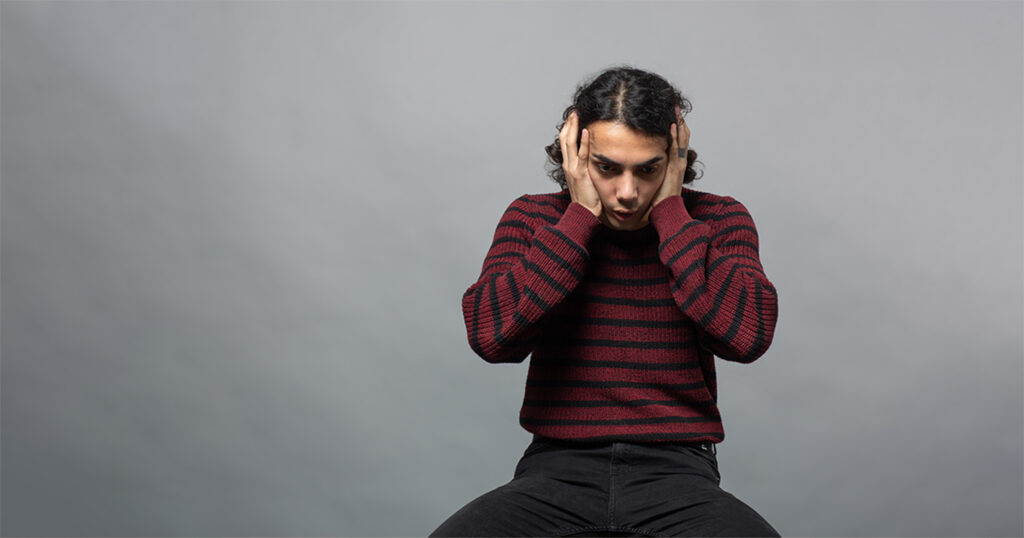Ever felt the knots in your stomach before a job interview or experienced your heart racing before your exams? This is you worrying about a potential threat in the future, or, in other words, feeling anxious. Every human experiences symptoms or feelings of anxiety now and then. Restlessness, distress, and nervousness are all signs of our body’s reaction to a possible or perceived threat. Anxiety can strike anytime, making it normal for you to have a search history looking for answers to “How to lower anxiety fast?” or “Different ways to get rid of anxiety within minutes.”
At SoulSensei, we consider anxiety a part of life but also understand the dire desire of a person to get rid of it. Through videos like Straw Breathing Practice for Anxiety Relief, blogs, and meditation resources, we aim to teach you different ways to achieve a life that is healthy, calm, and free from stress and anxiety. If you are on the quest to understand how one can relieve anxiety fast, this is the article for you!
Quick Ways to Relieve Anxiety
Anxiety refers to feelings of dread, fear, and discomfort, which may also result in restlessness and a pounding heart. While anxiety is often considered a normal reaction to stress, it can begin to interfere with your routine life and result in an anxiety disorder. You will need to consult a professional in cases of anxiety disorder, but for times when anxiety is temporary, we have got your back. Read further and learn more about how to lower anxiety quickly.
1. Accept Your Anxiety
When you are eager to learn how to instantly reduce anxiety, you might accidentally signal your nervous system that there are more reasons to feel anxious. This is when a simple act of acceptance can help ease your occasional anxiety. Let it have its moment instead of fighting it, and watch how seamlessly it reduces its impact on you. Do not try to distract yourself; instead, recognise your anxiety, understand that it is okay to experience it, and that you can function just as well even in its presence.
2. Practice Diaphragmatic Breathing
This is one of the easiest techniques to calm yourself in times of panic. To perform diaphragmatic breathing, try this:
- Step 1: Shut your eyes and breathe in as much air as possible. Inhale till your belly pokes out.
- Step 2: Hold your breath for a few seconds, tighten your abdominal muscles, and exhale as slowly as you can.
- Step 3: Repeat steps 1 and 2 until you feel relaxed and your anxiety fades away.
With diaphragmatic breathing, the slower you breathe out, the more you interact with the parasympathetic nervous system, which works towards calming your body down after a shock or fright. This slow, long exhale reminds the body that everything is fine and thus brings in a sense of calm and relaxation.
3. Try the 5-4-3-2-1 Coping Technique
The 5-4-3-2-1 coping method does wonders in calming anxiety; here’s how to do it:
- Five: Simply name 5 things from your surroundings.
- Four: Whether a book on your side table or the carpet on your floor, name 4 things you can touch.
- Three: Listen carefully and acknowledge 3 sounds you can hear around you.
- Two: Notice the smells around you and name 2 of them.
- One: Take note of 1 thing you can taste in your mouth (even a lip gloss counts).

4. Get Physically Active
Be it a 10-minute walk in the park or a 30-minute cardio workout, engaging in physical activities can significantly reduce feelings of anxiety. It helps by increasing your pulse rate and releasing endorphins. You can also try simple stretches, as they will help relax your body and, thus, your mind.
5. Try Guided Imagery
Your thoughts are powerful architects. By visualising desired outcomes, you can influence your physical responses. Try this: Picture a person, place, or thing that brings you the most happiness. For example, if you adore the serenity of a beach, smell the salt water, watch the sun set into the ocean, feel the sand on your feet, and hear the sounds of waves and birds. Take five slow breaths, and with each breath, imagine yourself inhaling comfort and love while exhaling fear and tension.
6. Identify and Name the Feeling
Recognising your feelings and labelling them as anxiety or describing the feeling will help you remind yourself that they are only temporary and that this stressful feeling will pass.
7. Go For a Cold Shower
You may trigger the mammalian dive reflex by splashing cold water on your face or taking a cold water shower. This reflex will help trick your body as if you are diving underwater, slow your heart rate, and bring about feelings of calm.
8. Recognise Your Triggers and Practise Self-Care
The best way to calm your anxiety is to know what triggers it. Pen down the situations that make you feel anxious. Once you identify these triggers, contrive a plan to manage them. You can try self-care routines such as a perfect sleep cycle, indulging in social interactions, making time for hobbies, and even establishing boundaries. Doing so will not only help reduce anxiety but also overall stress.
9. Seek Professional Help
If your anxiety stays for prolonged periods and begins to impact your routine life, it is best to seek professional help.
We hope this blog helps you learn how to quickly calm anxiety and allows you to improve your overall well-being. Stay tuned for more such mental health-related blogs and gain access to a treasure trove of knowledge in the realms of mind-body connection.
Sources
- Marie, S. (2021). Reduce Anxiety Now: How to Calm Down Quickly. [online] Psych Central.
- DeMarco, C. (2022). 7 anxiety hacks: How to manage stress and worry in the moment. [online] MD Anderson Cancer Center.
- Locke Hughes (2017). How to Stop Feeling Anxious Right Now. [online] WebMD.
- Ingram, A. (2022). How to Calm Anxiety. [online] Priory
- MedlinePlus (2016). Anxiety. [online]








